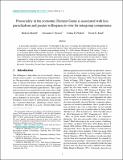Prosociality in the economic dictator game is associated with less parochialism and greater willingness to vote for intergroup compromise
Author(s)
Mosleh, M; Stewart, AJ; Plotkin, JB; Rand, DG
DownloadPublished version (439.9Kb)
Publisher with Creative Commons License
Publisher with Creative Commons License
Creative Commons Attribution
Terms of use
Metadata
Show full item recordAbstract
© 2020. The authors license this article under the terms of the Creative Commons Attribution 3.0 License. Is prosociality parochial or universalist? To shed light on this issue, we examine the relationship between the amount of money given to a stranger (giving in an incentivized Dictator Game) and intergroup attitudes and behavior in the context of randomly assigned teams (a minimal group paradigm) among N = 4,846 Amazon Mechanical Turk workers. Using a set of Dynamic Identity Diffusion Index measures, we find that participants who give more in the Dictator Game show less preferential identification with their team relative to the other team, and more identification with all participants regardless of team. Furthermore, in an incentivized Voter Game, participants who give more in the Dictator Game are more likely to support compromise by voting for the opposing team in order to avoid deadlock. Together, these results suggest that – at least in this subject pool and using these measures – prosociality is better characterized by universalism than parochialism.
Date issued
2020-01-01Department
Sloan School of Management; Massachusetts Institute of Technology. Department of Brain and Cognitive SciencesJournal
Judgment and Decision Making